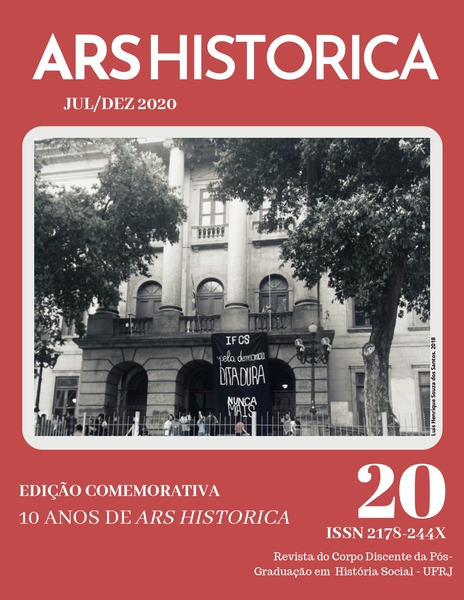WILLIAM LLOYD GARRISON E O CARÁTER INTERRACIAL DO MOVIMENTO ABOLICIONISTA
Palavras-chave:
Garrison, abolicionismo, negros livres.Resumo
Neste trabalho, pretendemos estudar a vida do abolicionista norte-americano William Lloyd Garrison. Com efeito, discutiremos a trajetória pessoal de Garrison e os momentos em que se conectou à experiência de afro-americanos de seu tempo. Analisaremos também o trabalho de Garrison em jornais abolicionistas, o qual culminou na fundação de seu próprio jornal, o The Liberator, que atuou como um potencializador de lutas abolicionistas com a parceria de Frederick Douglass, a quem Garrison conheceu numa convenção abolicionista. Concluiremos, assim, nossa nota de modo a assinalar o papel de Garrison como um propagador do imediatismo antiescravista, tão caro à experiência dos negros livres com quem ele conviveu.
Downloads
Referências
ABRUZZO, M. A. Humane Master — An Oblidging Neighbor — A True Philanthropist:
Slavery, Cruelty, and Moral Philosophy. The Princeton University Library Chronicle, New
Jersey, v. 66, n. 3, spring, p.493-521, 2005.
BLIGHT, D. Frederick Douglass: Prophet of Freedom. New York: Simon & Schuster, 2018.
BLIGHT, D. Perceptions of Southern Intransigence and the Rise of Radical Antislavery
Thought, 1816-1830. Journal of the Early Republic, Filadélfia, v. 3, n. 2, summer, p. 139-
, 1983.
BOURDIEU, P. A Ilusão Biográfica. In: FERREIRA, M. de M.; AMADO, J. Usos e Abusos
da História Oral. Rio de Janeiro: FGV, 2006. pp. 182-191
DAVIS, D. B. El problema de la esclavitud en la cultural occidental. Buenos Aires: Editorial
Paidos, 1968.
DAVIS, D. B. The Problem of Slavery in the Age of Revolution. Oxford: Oxford University
Press, 1999.
DE VRIES, J. The Industrious Revolution: Consumer Behavior and the Household Economy,
to the Present. Cambridge: Cambridge University Press, 2008.
DOUGLASS, F. Narrative of the Life of Frederick Douglass: An American Slave. Boston:
Bedford/St. Martin's, 2003.
ELTIS, D. Abolition and Identity in the very long run. In: KLOOSTER, Wim (Ed.). Migration,
Trade, and Slavery in an Expanding World: Essays in Honor of Pieter Emmer. Boston;
Leiden: Brill, 2009. pp. 227-258.
HABERMAS, J. Mudança estrutural da esfera pública. São Paulo: Editora UNESP, 2014.
HASKELL, T. Capitalism and the Origins of the Humanitarian Sensibility, Part 1. The
American Historical Review, Oxford, v. 9, n. 2, abr., p. 339-361, 1985.
KOSELLECK, R. Crítica e Crise: Uma contribuição à Patogênese do mundo burguês. Rio de
Janeiro: Editora Contraponto, 1999.
LEVI, Giovanni. Usos da biografia. In: FERREIRA, M. de M.; AMADO, J. Usos e Abusos da
História Oral. Rio de Janeiro: FGV, 2006. pp. 167-182.
THE LIBERATOR, Boston, ano 1, 1 jan. 1831.
LOVELAND, A. Evangelicalism and 'Immediate Emancipation' in American Antislavery
Thought. Journal of Southern History, Houston, v. 32, p. 172-180, 1966.
ROHRER, J. The Origins of the Temperance Movement: a Reinterpretation. Journal of
American Studies, Cambridge, v. 24, p. 228-235, 1990.
SINHA, M. The Slave’s Cause: A History of Abolition. New Haven: Yale University Press,
Downloads
Publicado
Edição
Seção
Licença
Autores que publicam nesta revista concordam com os seguintes termos:
Autores mantém os direitos autorais e concedem à revista o direito de primeira publicação;
As opiniões emitidas pelos autores são de sua exclusiva responsabilidade e não refletem a opinião da Ars Historica.

